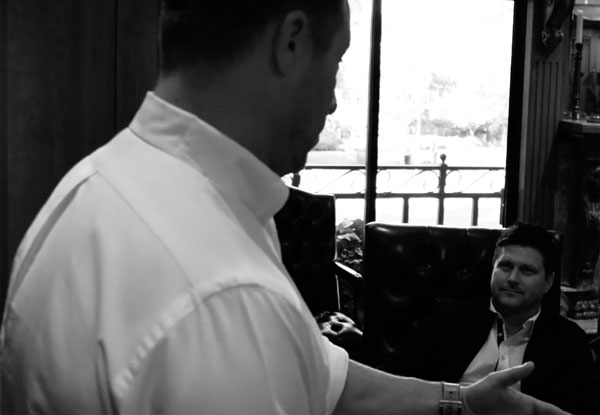Three Bell Client Spotlight: The Right Minds in the Room | Aric Marshall, ronin
Three Bell takes a look at ronin, a new way for your company to have rare minds in the room at exactly the right time.
What is ronin? Or who are they?
ronin is a solution to a huge problem for innovation. So many times, you can point to specific people in place at the heart of groundbreaking innovations. If only you could hire one of them to push your company onto that list… But you can’t. For companies ready to shift or grow, ronin is the right minds in the room when you need them. We bring our ronin—world-class strategic leaders across a variety of subjects—into a company for as much and as long as it takes to achieve the incredible. These are people you couldn’t possibly hire, dedicating themselves to realizing your vision. Or bringing the vision you need. ronin creates and leaves behind integrated strategies—and the teams to execute them.
What’s the old way?
A company’s executive leadership is its team of experts. They define and execute the vision of the company, each with a single, focused area of expertise: Direction, Technology, Finance, Marketing, Product, People, and so on. And it makes sense to have certain offices filled by dedicated in-house hires, available all-hours. They hold the knowledge that formed your company’s past and present, and that’s important. But what about the future? Small companies often take another route: they on-board an execution-level person to get things rolling, hoping that, without in-field guidance or mentorship, that person will somehow develop into the strategic leader the company needs. (Spoiler alert.)
Small companies almost never have the opportunity to bring proven leaders into the room, especially across multiple disciplines. As a matter of fact, you usually read in the news about the ones that have been lucky enough to do so—before they even do anything. The rest of us just have to hope our hires become heroes. For many leadership roles at both large and small companies, limiting options to dedicated full-time employees creates lose-lose situations. A trade-off happens that’s bad for the company and bad for the exec. You’ll pay a fortune for a full-time, experienced strategic leader, one capable of real impact. That cost is measured in salary, equity, perks, and other total-cost trappings, and it is expensive. Execs give back in time and creativity, which is even more expensive. Those are things people can’t get back.

How does ronin change that?
ronin brings world class minds to teams that wouldn’t normally have access, while opening unique opportunities to visionaries in their fields. Our ronin hail from a huge array of strategic disciplines. Product and Design, Marketing, Information Design, Public Relations, B2B and B2B2C sales, journalists, analysts, and executive leaders, as well as route-to-market experts in Automotive, Medical, Marine Tech, Audio, Consumer Goods and Services, and more. They come from companies like Apple, Google, Amazon, Meta, Roku, Jaguar-Land Rover, Automotive OEMs and Tier 1s, Johnson and Johnson, and others I can’t talk about here.
What they have in common: these are people you couldn’t possibly hire. Forgetting about the expense concern, we have ronin who are not even on the market. Whether they have retired at the top of their game and have more to offer, or others who still have (non-conflicting) commitments elsewhere, the structure of ronin means we can get them in a room with you, planning, building, and improving your company. That is ronin.
What does a ronin arrangement look like?
It’s a bit specific to the customer and need. But that’s not a very helpful answer, so here’s the idea. The core of ronin is foundational strategy, so there’s always a Product element. But usually there’s also a key area where more help is needed right now (Product, Marketing, PR, Sales, etc.). A ronin expert in that area will take lead to assist you, either by taking over in-house resources, by starting and leading a whole new team, or by working alongside your existing experts. Beyond that core area, the benefit of ronin’s network starts to take effect. At any moment, your ronin can access the best in other fields, often bringing them right into the meeting room as the need arises. Defining time and expertise requirements, ronin will suggest an initial contract—often a mix of cash and equity to lower up-front costs—to get things rolling.
Anytime there’s an additional strategic need, we adjust to bring in another ronin for a day, a month, or whatever is needed. As execution needs grow, ronin will help you hire fantastic talent suited to the task. This can start with junior team members who will be mentored, guided, and developed by the best, and continue all the way up to recruiting the in-house officer who replaces your ronin leader. There is no incentive or desire for ronin to stay beyond the need, milking billable hours of planned dependence (i.e., consulting). Many of our companies extend for years, varying the level and expertise they engage. We work together in targeted waves to progressively build new strategies, execute next steps, and hire and mentor in-house talent.

What kinds of companies can ronin help? What size or stage?
While most ronin share strong tech backgrounds for all types of world-changing hardware and software, we’ve also helped companies in cloud services (XaaS), licensable or stack layer inventions and techniques, consumer goods and services, education and learning, non-profits, finance, healthcare, fitness brands, media, entertainment, sports, automotive—and more. Strategy and execution shine just about anywhere. The best way to find out if ronin can help is to ask. As for size and stage, it might work to think about company growth as having two major types.
Let’s call the first scaling. Scaling turns up the volume on known or estimable capabilities. It’s neither simple nor straightforward, but this is precisely the activity at which your in-house officers should excel. And if they don’t, we can probably help replace them. When ronin has the most impact is the other kind of growth: expansion.
Expansion can be working on the next three versions of a product or moving into an unfamiliar product space; accessing new markets or routes to market; or reinventing a brand for a new audience. Or all of these together. The right help from ronin can turn these growth points exponential. And these moments of expansion happen to all companies, ranging from pre-seed start-ups to the world’s largest organizations.
Across my career, and especially in 15 years at Apple, I’ve seen personally times where only the exact right minds working together gathered to create vision that defined or re-defined a company.
Aric Marshall, ronin
Where did ronin come from?
Across my career, and especially in 15 years at Apple, I’ve seen personally times where only the exact right minds working together gathered to create vision that defined or re-defined a company. Every truly important endeavor comes from this beginning, followed by the ability to act on that vision and ship actual change. Companies of all sizes and stages are challenged to suddenly have all those right experts at defining moments, so instead they step into unfamiliar turf with teams built for an entirely different purpose—or not purposefully built at all.
What made you the person to create this?
Over my career I’ve been fortunate to become a bit of an expert in two key areas. Back at Apple I founded and led a technology team within Product that helped refine, launch, and demonstrate every product the company shipped for more than 12 years. That includes every hardware device: computer, phone, tablet, RAID. Every application: pro, consumer, media, creative, music. And every service: cloud, television, app store, and more music. I built specific skills in adopting and understanding a huge array of businesses, customers, markets, and products, as well as shaping the messages that brought them to market.
Later, I adopted dedicated product strategy roles. For two years I cut my teeth on Apple TV (take note: again hardware, software, service). Then after Apple bought Beats, I made the case that there was no overarching strategy—or roadmap—for Apple’s wide-ranging forays into audio. I spent three years working with Apple’s best to change that, touching everything from audio performance, whole-home audio, music and fitness, spatial audio in portable devices, to hearing health on the Watch, voice and Siri interactions, and others. We also planned, built, and shipped AirPods, HomePods, audio silicon, and a whole lot more.
After that olympic run, not many traditional jobs measured up. But I knew what I loved—and had become very good at: cohesive product strategy—leveraging all levels of a company’s expertise and talent—to deliver ideas that people love. And working with the experts who can get those products into the world.
Is ronin just a (San Francisco) Bay Area thing?
In the beginning we absolutely were. Our targets for help were companies seeking growth and change. The Bay Area was fertile ground to find amazing work. Two things changed: 1. In the last 5 years, strategy-defining leadership has moved beyond sitting in a meeting room or office. The best leaders are effectively integrating remote and in-person work: both incredibly valuable for collaborative strategy design. 2. Our collection of experts has expanded, with added core team members across the US, Europe, and the UK. These factors allow ronin to reach companies and applications way beyond the Bay Area.
Why are we talking about this now?
Our collection of ronin, companies, and connections has expanded and matured, covering new disciplines, product areas, and markets. That has changed the game of what we offer. Our ability to define world-class strategy, develop execution teams, and leverage expertise from adjacent fields is a new way to look at leadership. We believe this kind of flexibility could not have found a more receptive market, full of companies seeking a better path to success. So we wanted people to know about it.



